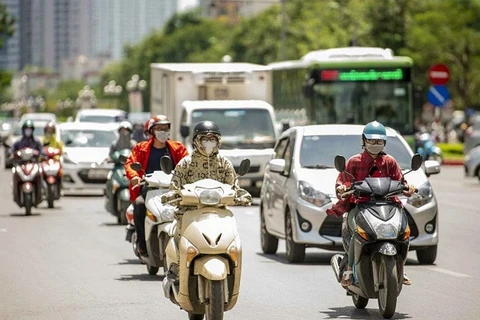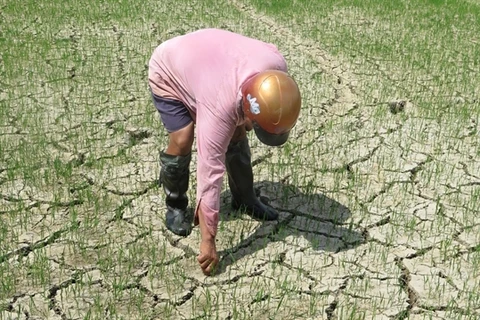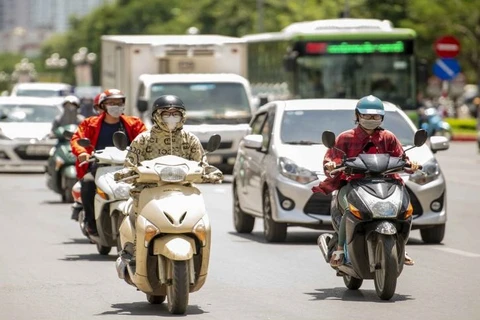Hanoi (VNA) - The heatwaves occurring across ASEAN countries signal the return of El Niño after three years. In this context, HSBC believes that Vietnamese agricultural products, including rice and coffee, are highly vulnerable.
The global research department of HSBC on July 13 published the report “ASEAN Perspectives - the arrival of El Niño" The report examines the climate phenomenon, which causes droughts and rainfall deficits, and its specific effects on the economies and inflation rates of six ASEAN markets. HSBC experts suggest that Vietnamese agricultural products, including rice and coffee, are highly susceptible to damage.
Agriculture bearing direct impact
As per the report, the agricultural sector of ASEAN is the most directly affected by El Nino. Vietnam is also not an exception in this regard.
The harsh manifestation of El Niño in 2015-16 had a detrimental impact on the region's economy. In its aftermath, rice production in countries such as Thailand and Vietnam dropped by more than 10%, exemplifying the potential threats posed by this phenomenon.
Whilst coffee might be considered a 'minor' commodity in comparison to others, its significance should not be underestimated, especially given the wide array of global consumers who perceive it as a daily essential. Despite the fact that it constitutes less than 1% of total exports, on a par with palm oil, Vietnam and Indonesia nonetheless supply a quarter of the world's coffee.
The majority of this contribution is in the form of Robusta beans, characterised by their bitter taste and heightened acidity. It's worth revisiting the 2015-16 period when coffee production in these economies slumped by 10%, inciting speculation regarding the potential ramifications of El Niño this time around.
 Coffee is also a commodity that is susceptible to damage due to the occurrence of El Nino. (Photo: VietnamPlus)
Coffee is also a commodity that is susceptible to damage due to the occurrence of El Nino. (Photo: VietnamPlus) More pointedly, forecasts from the USDA suggest a decline in Robusta production in Indonesia by 20% in the 2023/24 cycle, as the dry season has made an earlier appearance, impacting over 60% of the coffee-producing region.
Moreover, ASEAN's global preeminence in the palm oil market is well documented. Whilst the El Niño phenomenon is still in its infancy, authorities in both Indonesia and Malaysia have raised alerts about potential disturbances to palm oil yields. Indonesia has declared emergency measures in seven provinces, predominantly those engaged in palm oil production.
The Malaysian Palm Oil Board has cautioned that production could decrease by 1-3 million tonnes (6-17%) during this episode. However, the impact is anticipated to be less drastic than during the 2015-16 El Niño event, which saw a reduction of 20%, due to better farming practices and enhanced labour conditions.
Industrial production disrupted
HSBC experts also pointed out another secondary impact, which is the disruption of industrial production due to energy shortages. As of early June, a number of Vietnam's northern provinces, which host major electronics manufacturers such as Samsung and Foxconn, have grappled with electricity shortages. These power disruptions are caused by a dearth of hydropower, a significant source of electricity in the region, as the heat and droughts associated with El Niño have led to reservoirs drying up, even causing major dams in the north to reach dead storage levels.
 HSBC experts pointes out another secondary impact, which is the disruption of industrial production due to energy shortages. (Photo: VietnamPlus)
HSBC experts pointes out another secondary impact, which is the disruption of industrial production due to energy shortages. (Photo: VietnamPlus) Fortunately, recent moderate rains have caused the water levels in all reservoirs across the nation to surpass the threshold required for safe electricity generation, according to state utility Vietnam Electricity (EVN). Consequently, after several electronics manufacturers had to curtail production, power shortages have started to diminish recently, facilitating factories to extend their operating hours. However, economists at HSBC stress that El Niño-related energy risks require closer observation, as they may exacerbate Vietnam’s manufacturing vulnerabilities, especially during a period when the country has been dealing with the escalating challenge of dwindling export orders.
Fortuitously, ASEAN policymakers demonstrate acute awareness of the implications of El Niño, issuing early warnings and proactively adopting measures to fortify against potential economic disruptions. Countries have turned to tactics such as cloud seeding, augmenting specific agricultural imports, and implementing partial manufacturing cutbacks to offset potential disruptions induced by El Niño, as indicated in the report./.
























